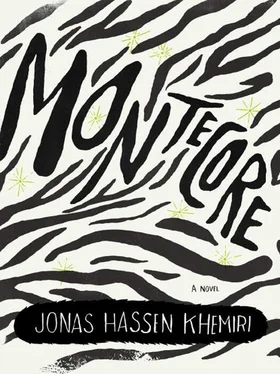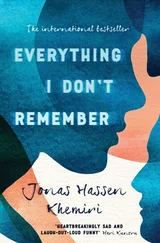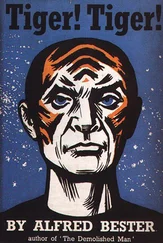“Abbas!” I cried happily, and our arms hugged each other, accompanied by repeated confirmations of each other’s health. Then we released each other and your father observed me. He was just about to formulate something; his lips circled themselves, but no sound came. In the next second his legs swerved sideways. His body timber-fell toward the sidewalk, and his near fainting was my fact. I supported him into the foyer on shaking legs and parked him in the leather sofa that was actually reserved for guests. His cheeks bore a pale color and it seemed to hurt to separate his adhered lips.
“What has happened to you?” I asked, again and again. “Is it the funeral of Faizal that has ached you so much? Or is it the return visit of Jendouba? Calm my unease, my dear best friend.”
Your father collected his nerves, cooled his throat with a few gulps of water, and began his story. I remember his words like this:
“Excuse me, Kadir. I am very glad to see you again, do not believe otherwise. But to see Jendouba again was a very suffocating process. I really understand why you do not return. To participate in Faizal’s funeral awoke an inexplicably strong emotion in my breast. The tears welled my eyes in rivers, and my leg muscles betrayed me cyclically just like here. That he was not my real father could not comfort me. I do not know why the consequence was so great.”
Your father was interrupted by some drunk Dutchmen who bellowed their happiness from the bar over a soccer goal. He continued with a steadier voice:
“After the funeral I did not find any peace. Of course, I portioned my sorrow with everyone else; of course, it was happiness to see Cherifa again. But every day our sorrow was disturbed by afflicting neighbors and poor families with hopeful expectations that my saved Swedish finances had been maximized to that of a millionaire. They knocked the door and interpellated me about investment aid for taxis, finances for cheese factories or travels abroad, bribes for visas or for supporting their cousin’s children’s study diplomas. Even our old friends from the orphanage days were looking forward to sumptuous presents as a matter of routine. Dhib and Sofiane, Amine and Omar, not one understood that I have my own family and that my finances might not measure up to JR’s in the TV series Ewings . Do you know that TV series, by the way?”
(Your father really did say Ewings but was referring to the series Dallas , of course. I did not want to correct him right then.)
“Anyway, it is a big success in Sweden; Pernilla and I observe it every Saturday evening when Jonas has gone to sleep. It is about JR and Bobby and an alcoholic woman by the name Sue Ellen. The music sounds about like this: daa-da-daaa-dadadadadaaa …?”
“Abbas … weren’t you going to relate the background of your mental imbalance?”
Your father quieted his song.
“You are right, Kadir. Excuse me. You are truly the only person in the world who sees through my attempts at dodging. Let me instead tell you about the true background of my confusion. It happened this morning … It was the souk in Jendouba. As usual, the city was full of agricultural families who auctioned peppers and figs, apples and pears, wagonloads of golden melons. Salesmen’s throats roared sweetness of peaches, durability of lightbulbs, softness of rugs. Bananas and green cubes of washing soap, veils and spice buckets and extra-fresh goats at the price of the sale …”
(Yet again your father tried to evade in a drawn-out description of the souk. You have, of course, visited Jendouba during the souk? Feel free to inject your own memories of the market — just remember that this is 1984. Subtract consequently all commerce of neon yellow cell phone covers, batteries, Eminem T-shirts, and fake Nike shoes.) Finally I interrupted your father:
“Abbas … get to the point.”
“Yes. Sorry. Here it comes. Anyway, this morning I wandered my steps toward the louage station, happy that I could leave the city. My camera was escorted as usual on my chest. Suddenly I noticed a dispute between a street boy and a potbellied seller of saucepans. Here is photographic potential, I thought, levitating my camera and assuming a perfect angle.”
“Well?”
Your father took his bracing in order to be able to terminate the story.
“I adjusted the focus and discharged the camera at the exact second that a face wandered right in and blocked my motif. His head bore a twisted, worn keffiyeh; his bagging blue jacket was combined with thin drawstring pants. In his hand he transported a foot-borne turkey which gesticulated its arms. I lowered the camera with an insultation ready on my tongue. Our eyes were reflected in each other. A few seconds’ searching, and then my insight struck with the power of a waterfall. ‘RACHID!’ roared my tongue so that the potbellied man shortstopped himself in his kicking series against the shorts-clad rear of the street urchin. ‘RACHID!!!’”
“Your antique neighbor from Algeria?”
“Yes! First he seemed to mistake himself for someone else. He accelerated his steps to running speed and refused to give hearing to his name. But I caught up with him and captured his shoulder: ‘Hello! It is me! Abbas! Haifa’s son. Whom you saved from a sure death!’ Rachid stopped, out of breath, focused me from toe to top, and cracked up his smile.
“ ‘My dear boy, you have been transformed to a man! And you are not angry with me?’
“ ‘Angry? How could I be angry?’ For a long time we hugged each other, teared our eyes, and returned our greetings. All while the turkey cawed confusion and wobbled its throat.”
“Did he look as you remembered him?”
“Well, the tooth of time had munched a festive breakfast on his exterior; the sun wrinkles hung heavy over his furrowed eye corners, his black beard shone gray, and his shoulders had thinned to the boy size.”
“Then when happened?”
“We accompanied our steps to a café, where we shared our résumés. Rachid was very impressed by my life. ‘Who could believe this when we farewelled each other in Cherifa’s yard?’ he said. ‘That you would live in Sweden, have a stately stature and a photographic career?’
“ ‘And that you would bear your exterior with the same youth as always,’ I responsed.
“ ‘Thank you very much, you well-mannered liar.’ We laughed in stereo and the atmosphere was excellent.”
“It sounds like a perfect rendezvous. Right?”
Your father extincted his smile.
“It was a perfect rendezvous. Until I happened to ask Rachid whether he was acquainted with anything about my real father’s news. I interpellated whether my father’s life was ended like Ali Boumendjel’s, or whether he is perhaps living in luxury somewhere in the world. Rachid fixed his eyes on the horizon and let his lungs produce a deep sigh.
“ ‘Your father … dear Moussa. Is your separation not tragic?’
“ ‘Please, Rachid, tragicness exists to be overcome. This is my life philosophy. But are you acquainted with any information about his present existence?’ Rachid’s face looked ashamed.
“ ‘I promised your father, you know … to assist you if anything happened … He had given me the pay of advance … But I didn’t have any chance myself to … Well … Of course I couldn’t take care of you alone … After all the rumors that Haifa had spread. And the economy he left behind was barely enough for … My hope is for your broad and eternal understanding?’
“ ‘Of course, of course … My understanding is wide as a soccer field,’ I noted impatiently. ‘But my father … Moussa … do you know if he survived his journey abroad?’
“Rachid observed the angles of both of his shoulders and then gave a close-leaned whisper.
Читать дальше










